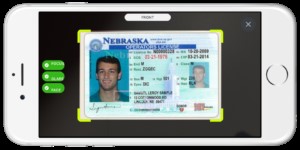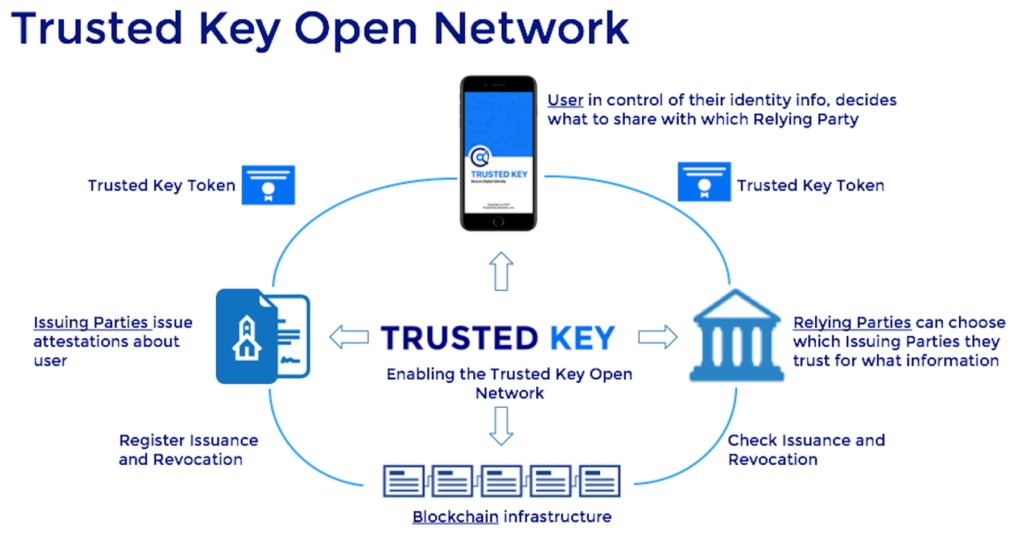In a digital world, can you truly be 100% certain that a person is who s/he claim to be? Establishing identity is one of the biggest challenges facing a wide range of participants from institutions such as banks and governments to individual e-commerce merchants. Not being able to do so opens one up to the risks of fraud. Trusted Key Solutions, a Seattle, WA based Blockchain startup, has developed a revolutionary product that can create Blockchain based digital identities to make transactions secure. Trusted Key recently raised $3 million from Founders Co-Op and Pithia Inc as part of its seed funding round.

Prakash Sundaresan (Left) and Amit Mital (Right) during a demonstration at Finovate in 2017
Founded in 2016, Trusted Key’s leadership team comprises of Prakash Sundaresan (Founder and CTO), Amit Mital (Chairman), and Amit Jasuja (CEO). The technical credentials of the team are also strong with Amit Mital having 46 patents to his credit and Prakash Sundaresan having been the former CTO of Microsoft Asia-Pacific R&D. Trusted Key has also been active at various forums demonstrating their product and winning awards. It was also covered in the CIOReview’s “20 Most Promising Identity Governance & Administration Solution Providers – 2017”

Prakash Sundaresan with the Blockchain Education Champion Award at Blockchain Essentials in Education 2018
Trusted Key Solutions
Trusted Key’s products help in three critical areas – making KYC easier, securing authentication without passwords, and preventing frauds. A 2017 report by Thomson Reuters found that the global annual average spending on KYC is $48 million, with banks spending an average of $70 million. While passwords are the most common way of authentication, they can be compromised. Every year, billions of leaked username-password combinations are found. Identity frauds, where credentials of one person are used by an unauthorized person for financial gain, are on the rise with over 16.7 million victims and losses over $16.8 billion in 2017.
Trusted Key solves these challenges with a system that has three components – a smart phone, cryptography and Blockchain. Cryptography is a way of converting text from one form to another to disguise the information and Blockchain is a decentralized way of recording transactions. Trusted Key has developed an App which is a digital wallet where a user can log in and locally store their credentials in a cryptographically secure environment after verifying the authenticity of the credential. The App can only be accessed by entering a key or by unlocking it with a fingerprint. Currently, Trusted Key supports driver’s licences, passports and cards (credit, etc.).

An ID card being uploaded on the app
The system is very elegant. Anyone can download the Trusted Key App and create an account. The user can then upload a driver’s licence or passport to be authenticated while also providing a live selfie from the app the ensure that the identities match. Once the verification is done, a digital version of the id containing all the information is given. This is stored locally on the device and is cryptographically secure giving access only to the user. The user can use this to verify his/her credentials online. With no passwords being involved and the credentials being stored locally on the device, the authenticity of a transaction is significantly higher. Apart from having permissioned and public models, the unique thing about Trusted Key is that their platform can be used by others to build their own digital identity wallet.

The Trusted Key Open Network
Trusted Key Impact and Economics
The impact Trusted Key has is significant. It makes customer acquisition easier for Banks as they can onboard customers with verified KYC documents without the customer having to visit a branch. The verification system helps merchants verify a transaction with the buyer. Merchants are otherwise in a precarious situation where outcomes such as turning away a good customer or accepting a fraudulent transaction results in losses. The applications that Trusted Key is focused on range from education and healthcare to enterprise access management and financial institutions.
What makes Trusted Key powerful is not just the security and convenience it provides, but also the underlying economics. E-commerce companies, banks and other financial institutions have large teams focused on detecting and preventing frauds. With large investigation teams, the marginal cost of verification or investigation is high. Trusted Key can reach a point where the marginal cost (cost of verifying another transaction or user) tends towards zero. This makes scaling viable and mass adoption possible. Trusted Key is able to make the business model more secure without disrupting it. Financial institutions and merchants end up saving on chargeback fees due to frauds and fines for not complying with KYC requirements.

Team Trusted Key at the Mobile World Congress 2018
Since 2014, the Blockchain space has seen innovation and several use cases.
The Blockchain identity space has a similar trend with many startups emerging since 2015. The competitive landscape has giants such as IBM, Microsoft as well as startups and open source projects. Consortiums focused on Blockchain based identity solutions also play a pivotal role in the landscape.
Learning Machine and Cambridge Blockchain are two formidable US based competitors who have recently raised $3 million and $7 million respectively. With pilot projects with the government of Malta, MIT and Federation of State Medical Boards, Learning Machine has an advantage in the education space. Cambridge Blockchain has strategic alliances with IHS Markit and LuxTrust to provide its KYC and identity services. The startup has been quick to expand overseas, setting up an office in Paris and joining a European initiative backed by the government of Luxembourg called INFRACHAIN with members such as Deloitte and Ant financials among others.
Trusted Key ran a pilot project in partnership with the National Health Information Sharing and Analysis Center (NH-ISAC) for digital identity in the health care space. The project has the potential to reach more than 150 million consumers in the U.S. Trusted Key is part of the Decentralized Identity Foundation (DIF) consortium with Microsoft, IBM and others.
In an increasingly digital world, digital identity is an important piece in the system. While systems may be trust-less, trust continues to be essential. Alliances that Blockchain identity companies build will determine their acceptance in the market. The evolution of this sector will be interesting to watch. Maybe in a few years, we might be using the Trusted Key App to create a bank account.
Subscribe to our newsletter



